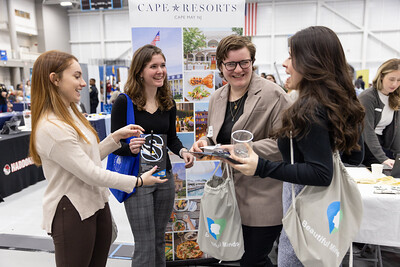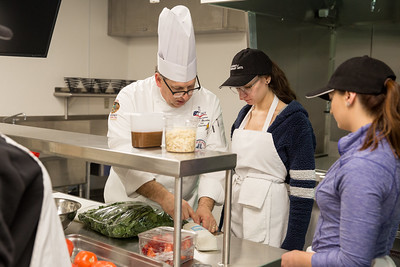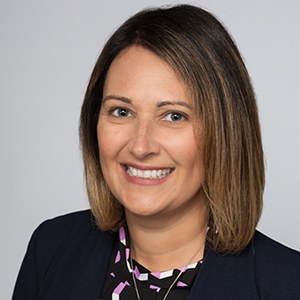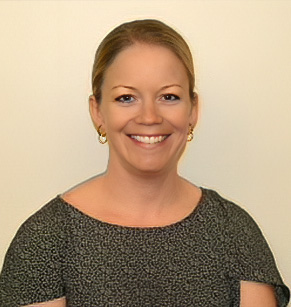Shining a LIGHT on Meaningful Internship Experiences

By Dayna DeFiore, assistant director, Career Education and Development, and Tara Marsh, HTMS internship coordinator, School of Business, Stockton University
Dayna DeFiore, M.A., GCDF
Assistant Director, Career Education and Development,
Stockton University
Tara Marsh
HTMS Internship Coordinator, School of Business,
Stockton University
The Hospitality, Tourism and Event Management (HTMS) Bachelor of Science Degree Program in Stockton University’s School of Business makes a commitment in its curriculum to cultivate robust internship experiences for its students through an extremely rigorous required internship course at the culmination of their Experiential Learning Sequence. Like all mutually beneficial relationships, this cannot be accomplished without collaboration and partnership. To ensure sustainability of this partnership, Career Education and Development (CED) drives the University’s comprehensive approach to employer relations and executing meaningful ways to support its student employment initiatives while ensuring employers' business needs are met with a prepared workforce.
Students start the Experiential Learning Sequence with a 0-credit course known as Professional Work Experience, which is usually taken in either their freshman or sophomore year, and exhibits that they have worked within the hospitality industry in some capacity. Positions such as a front desk agent, concierge, event coordinator/planner, housekeeper, food server, and valet, will all qualify for this 400-hour work requirement. As a student nears the completion of the 400 hours or has completed the hours altogether, they will enroll in the course and complete a “Semester To-Do List” that is graded as a Pass/Fail. The list consists of meeting with the instructor to get their work experience approved, attending a Resume Writing Work Session co-hosted by the instructor and Career Education and Development, uploading a copy of their resume from this work session to their Handshake profile, proving their 400 hours worked, and writing a 3-5 page reflective paper on their experience highlighting how it has helped them grow both personally and professionally, as well as how it is helping them determine what they want to do for their internship.
After completing Professional Work Experience, students then take a 4-credit course called Career Development in either their sophomore or junior year, which takes a deeper dive into not only resume building and ways to search for an internship, but also opens the students’ eyes to the working world, how they as an employee perceive it, what their strengths and weaknesses are as an employee, and what they really want in an employer. The students are becoming aware of their value as an employee and investing in themselves to secure the foundation of their individual skill sets and what they bring to an organization. After the completion of these two prerequisite courses, a student will take the Internship course either at the very end of their junior year or somewhere in their senior year. The internship course is a 4-credit online course taught throughout the year in the Fall, Spring, and Summer semesters allowing students to go “Anywhere, Anytime” to locations such as Disney, Hershey Entertainment & Resorts, Marriott Vacations Worldwide, and even places abroad. The possibilities are endless, but must also be paid for those students who are working in for-profit companies. This commitment strengthens the experience for all involved; holding students accountable for their work performance, employers accountable for training and mentorship of the students, and everyone reaping the benefits of this working relationship.
During their internship experience, we challenge the students to take on more of a managerial role in their place of employment. If a managerial position is not available, we encourage them to work closely with their direct manager/supervisor to learn and take on more higher-level responsibilities, again expanding on their skill sets. It is through this opportunity that the students then create a project that helps to enhance their organization or department overall using their fresh set of “new/outside” eyes to change something procedurally, setting a new way into action and improving the process. This project solidifies the students’ contribution to the organization and lets them become an integral part of the everyday operations. Throughout the rest of the coursework during the semester, they will have discussions with their peers on various topics as it relates to the work environment, such as ethical behavior, professionalism and teamwork, as well as completing a self-evaluation and reflection on the pinnacle of their experience. Students take this time to reflect on how their experience relates to the extensive coursework they have done throughout the duration of their time in the program and can see what they are working toward with the completion of their degree as they enter the workforce.

Through the internship semester, we continue to support the employer, guiding and helping them to troubleshoot any issues that may arise in their working contract with the students. Employers are required to also evaluate the students one to two times during the semester focusing on their performance from communication in the workplace to problem solving to teamwork and even their ability to balance between work and their personal life, as well as the benefits and problems associated with their project.
The students’ internship experience holds a great amount of value for them, giving them the opportunity to gain hands-on experience in the industry, but it also provides extreme benefits to the employers. Not only do they gain a new employee, an extra set of hands, and someone they can rely on, but they begin their journey of a continuous working relationship with the HTMS Program, Career Education and Development, and Stockton itself. The initial contact with us can come through either the student finding their internship themselves, to which we then help the employer complete required paperwork to solidify the internship agreement between them, the student, and the university, or the employer can reach out to us through various channels and we help them to get setup with our Handshake platform to begin connecting with, recruiting, and interviewing our students for their internships/jobs.
Career Education and Development implemented Handshake to support career management efforts for students, recent alumni and employer partners in 2020. According to Handshake’s website, within a few years of launching the system (2014) they grew to be the leading early career community in the U.S. As such, Stockton promotes the tool to students and recent alumni as a viable source to identify internship and early career opportunities. The entire Stockton community plays a part in centralizing employment opportunities by cross promoting the system to their professional network. Our goal is to ensure that students and alumni have 24/7 access to information, opportunities and networking events.

Employers also have access to the system 24/7 with use of features that include, promoting unlimited number of positions, listing networking events, registering to participate in virtual and in person career and internship fairs and direct student profile search and chat features.
At Stockton University, Career Education and Development reviews each position posted to ensure that it follows the guidelines of the National Association of Colleges and Employers (NACE) when defining and articulating an internship experience for students. This includes advocating for paid internships and requires all credit-bearing internships be paid with for-profit organizations. In 2023, NACE released a new position statement on unpaid internships with the following goals in mind, which include promoting equity and access by removing barriers that limit who can take part; recognizing that interns perform work—and all work should be paid and supporting diversifying the workforce by creating an inclusive pool of entry-level candidates who have the experience and competencies employers seek. This checks and balances step ensures that relevant positions are activated. Career Education and Development works with faculty and staff colleagues to further communicate opportunities directly to internship seekers.
Meaningful partnerships with employers goes beyond Handshake and digital platforms. Employers are encouraged to explore an inter-department approach to campus engagement while creating short and long term internship recruitment goals in collaboration with the Hospitality, Tourism and Event Management Internship Coordinator and CED employer relations team. Collectively we serve in a consultant capacity, providing insights on emerging internship program structures, recruitment best practices, navigating credit-bearing internships and Stockton’s internal systems. Employers are invited to participate in campus activities including Career and Internship Fairs, Employer-in-Residence Programs, information tabling, classroom speaking engagements, tours, connections with clubs, organizations, affinity groups and attend our Annual Internship Partner Breakfast.
This strong network built among the University, HTMS Program, Career Education and Development, employers, and most importantly the students, affords us to connect the dots to a most meaningful experience for all those involved.





